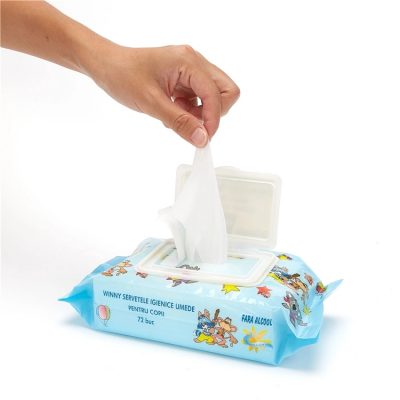1. Look for “Biodegradable” or “Compostable” Labels:
- Make sure the wipes are labeled as biodegradable or compostable. These terms indicate that the wipes are designed to break down in a way that’s less harmful to the environment.
2. Check the Material:
- Biodegradable wipes are often made from sustainable and renewable materials, such as plant-based fibers like bamboo or cotton.
3. Avoid Synthetic Materials:
- Steer clear of wipes made from synthetic materials like polyester, as they take longer to break down and can contribute to microplastic pollution.
4. Consider Packaging:
- Look for wipes that come in biodegradable or recyclable packaging to ensure the entire product is eco-friendly.
5. Read Ingredients Carefully:
- Even in biodegradable wipes, check the ingredients to ensure they are gentle and suitable for your skin type.
6. Certified Products:
- Some wipes carry certifications such as “Certified Biodegradable” or “USDA Certified Biobased Product.” These certifications validate the eco-friendly claims of the product.
7. Evaluate Brand Practices:
- Research the brand’s commitment to sustainability. Brands that prioritize environmentally-friendly practices throughout their manufacturing and distribution are more likely to offer genuine eco-friendly products.
8. Avoid Added Chemicals:
- Choose wipes that are free from unnecessary additives, fragrances, and harsh chemicals. This is better for both your skin and the environment.
9. Choose Multi-Purpose Wipes:
- Opt for wipes that can serve multiple purposes, reducing the need for different types of wipes and minimizing waste.
10. Support Refill Programs: – Some eco-friendly brands offer refill options for their wipes, reducing packaging waste and often being more cost-effective.
11. DIY Reusable Wipes: – Consider making your own reusable wipes from washable cloth or fabric. These can be used with natural cleaning solutions and washed for repeated use.
12. Reviews and Recommendations: – Read reviews and seek recommendations from others who have tried different biodegradable wipes. Their experiences can help you find quality options.
13. Cost Consideration: – Biodegradable and eco-friendly wipes may be slightly more expensive than traditional wipes due to their sustainable materials and production processes. Consider the overall value and environmental benefits.
14. Support Sustainable Brands: – By purchasing biodegradable wipes from sustainable brands, you’re supporting companies that are actively working to reduce their environmental impact.
Using biodegradable wipes is a step toward reducing plastic pollution and minimizing your carbon footprint. As consumer demand for eco-friendly products grows, more options are becoming available, making it easier to make environmentally-conscious choices in your daily routines.


















